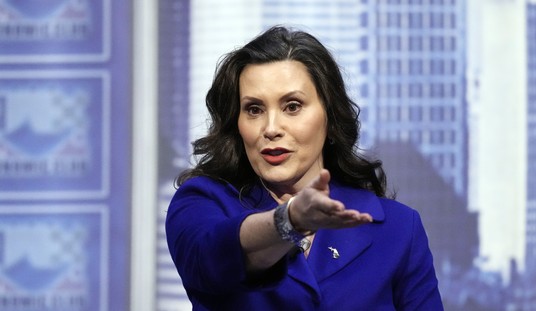
President Donald Trump speaks during a Made in America showcase event on the South Lawn of the White House, Monday, July 15, 2019, in Washington. (AP Photo/Alex Brandon)
Stop me if you’ve heard these lines before.
“Impeachment is a political process!” followed by some form of “the House can impeach for anything it wants!” and “high crimes and misdemeanors don’t have to actually include a crime!”
As many of our parents once warned us, just because you can do something, that doesn’t make it a good idea. In the case of impeachment and the subsequent Senate trial, removing a president without a crime being committed is a terrible precedent to pursue. Unfortunately, that’s exactly what Democrats are trying to do right now.
Take the case of Andrew Johnson, the first U.S. president to be impeached. Though the attempt ultimately narrowly failed, the incredibly political nature behind his impeachment has served as a stark reminder of the dangers of trying to remove a president for policy disagreements, even if some feel those disagreements are an “abuse of power” or immoral.
You’ll often see Johnson brought up today to serve as proof that it’s perfectly acceptable to impeach a president without a crime. The only problem with that is that bringing up Johnson makes a strong case against that idea.
Johnson attempted to remove his Secretary of War, Edwin Stanton, who was directly undermining his policies toward the south in the years after the Civil War. He tried to place General Grant in that position as an interim to please his critics.
The policy disagreement was over the President’s belief that Stanton and his military commanders could not override civil authorities in the south by decree. The Congress, along party lines, did not like that position and wanted to force Johnson to keep Stanton in office. Normal constitutional governance would have dictated that the president has the statutory authority to remove someone they feel isn’t serving their administration’s interests. Congress, though, because it disagreed with Johnson’s policy position, cited a short-lived law titled the “Tenure of Office Act” (effectual from 1867-1887) to claim the removal of Stanton was illegitimate. Stanton refused to leave office, and everything broke down from there.
After much machination, this eventually led to Johnson’s impeachment, with claims he had abused his power by “intentionally” breaking the Tenure of Office Act. In the end, Johnson relied on the defense that the act only applied to officials appointed by the President. Stanton was put in place by Lincoln and not an appointee of Johnson. He prevailed, remaining in office by an extremely narrow margin.
Of course, the technicalities claimed by the Congress to impeach Johnson weren’t the whole story. Johnson was a racist and had handicapped African-Americans in the years following the war. This had upset Republicans (a reminder of who actually has the record of fighting for African-Americans throughout this country’s history), and rightly so. Johnson’s policies were enabling southern municipalities to continue to abuse their black populations contrary to the recently passed 13th Amendment.
Regardless of the moral precepts at play in 1868, the broader question was always whether policy disagreements should ever rise to the level of impeachment. The general consensus after Johnson’s impeachment and acquittal is that they shouldn’t and that a crime should actually have to be committed. That’s been the standard that’s held for over 150 years. It was respected in the case of Bill Clinton, who was only impeached after committing perjury.
In the age of Trump, we’ve seen calls for impeachment for literally dozens of purely policy or political positions. His travel ban, the Emoluments Clause, things he’s said on Twitter, and even for him bringing “disgrace to the office.” The fact that Democrats now feel they’ve found a technicality to get him on involving Ukraine doesn’t change the overall calculus of what’s going on. As Eric Ciaramella’s (the alleged whistle-blower’s) lawyer said back in 2017, “the coup has started.” From the moment Trump took office, the goal was to get him out of office by any means necessary.
Like Johnson, the decision to impeach Trump was not made based on a narrow set of circumstances. It was pursued based on widespread political disagreements adding up over time. There is no crime present in anything Trump has done regarding Ukraine. Even the most uncharitable interpretations of his motives regarding investigating corruption end with nebulous claims of “abuse of power” and attempting to “influence the election.” In reality, nearly everything a president does is attempting to influence the next election. The question is whether the request is illegal or at the very least, so provably improper as to warrant removal (i.e., the idea that investigating Burisma was somehow out of bounds or illegitimate). I continue to believe neither of those things is currently present.
In the end, Johnson’s impeachment didn’t set the precedent that no crime is needed to impeach a President. On the contrary, it set the precedent that one is almost certainly needed for the legitimacy of the process. That precedent has been respected for the last 150-plus years because it’s a very good standard. To allow disagreements on policy and judgments about “abuse of power” to become the normal basis for removing a president would profoundly wound this country. If Trump can be impeached for suggesting a foreign ally look into a corrupt company (where a former vice president’s son was getting paid incredible amounts of cash to be name-dropped at the State Department to end investigations against them), then impeachment will quickly become an often used, wholly political mess.
Even if one suspects Trump felt he could benefit politically from such a move, so what? If voters feel he stepped over the line, that’s what we have elections for, and one is coming up in less than a year. There were many times I felt Barack Obama “abused his power” for his political gain. Does anyone really think the Iran deal wasn’t largely shaped for his political benefit? I never called for him to be impeached, though, and neither did the vast majority of Republicans in office.
Democrats are crossing a line that probably can’t be uncrossed given the way information flows in the modern age. If they want this to be the new normal, they should be careful what they wish for. Attempting to remove Trump based on what boils down to policy disagreements and political judgments is a terrible precedent to set. The damage to the country this is going to do will be far greater than any short-lived political gain the Democrats feel they may get here. I’d hope they would recognize that, but they won’t.
———————————————
Enjoying the read? Please visit my archive to read more of my latest articles.
Find me on Twitter and help out by following @bonchieredstate.














